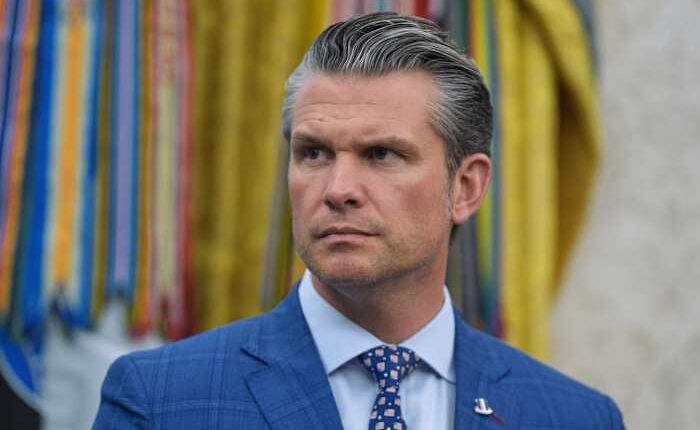
Defense Secretary Pete Hegseth has tightened restrictions on the press, preventing reporters from accessing certain parts of the Pentagon without a government escort. These areas, previously open to the press, are crucial for covering the activities of the world’s most powerful military.
Among the newly restricted areas are Hegseth’s office, his top aides’ offices, and various locations within the Pentagon housing press offices for the Army, Air Force, Navy, Marine Corps, and Space Force.
Reporters will now need approval from Hegseth and an escort from his aides to enter the offices of senior military leaders at the Pentagon, including Gen. Dan Caine, the Chairman of the Joint Chiefs. This move marks a departure from the traditionally good relationship between the Joint Chiefs staff and the media.
Hegseth, the former Fox News Channel personality, issued his order via a posting on X late on a Friday afternoon before a holiday weekend. He said it was necessary for national security.
“While the department remains committed to transparency, the department is equally obligated to protect (classified intelligence information) and sensitive information, the unauthorized disclosure of which could put the lives of U.S. service members in danger,” wrote Hegseth.
The Pentagon Press Association expressed skepticism that operational concerns were at play — and linked the move to previous actions by Hegseth’s office that impede journalists and their coverage.
“There is no way to sugarcoat it. Today’s memo by Secretary Hegseth appears to be a direct attack on the freedom of the press and America’s right to know what its military is doing,” it said in a statement Friday night. “The Pentagon Press Association is extremely concerned by the decision to restrict movement of accredited journalists within the Pentagon through non-secured, unclassified hallways.”
Hegseth also said reporters will be required to sign a form to protect sensitive information and would be issued a new badge that more clearly identifies them as press. It was not clear whether signing the form would be a condition of continued access to the building.
Two months ago, the department was embarrassed by a leak to The New York Times that billionaire Elon Musk was to get a briefing on the U.S. military’s plans in case a war broke out with China. That briefing never took place, on President Donald Trump’s orders, and Hegseth suspended two Pentagon officials as part of an investigation into how that news got out.
The Pentagon was also embarrassed when the editor-in-chief of The Atlantic, Jeffrey Goldberg, was inadvertently included in a group chat on the Signal messaging app where Hegseth discussed plans for upcoming military strikes in Yemen. Trump’s former national security adviser, Mike Waltz, took responsibility for Goldberg being included and was shifted to another job.
The administration has taken several aggressive actions toward the press since Trump took over, including FCC investigations into ABC, CBS and NBC News. Restrictions imposed on The Associated Press’ access to certain White House events earlier this year led to a court battle that is ongoing.
The White House has also increased access for conservative media that are friendly to the president. Nevertheless, a study released earlier this month found that Trump had more frequent exchanges with reporters during his first 100 days in office than any of his six predecessors.
Hegseth, however, has been far less available. He has yet to speak to the press in the Pentagon briefing room. Pentagon spokesman Sean Parnell has held only one Pentagon press briefing since Jan. 20. The Pentagon has taken other steps to make it more difficult for reporters, including taking office space away from eight media outlets, including The New York Times, The Washington Post, CNN and NBC.
___
David Bauder writes about media for the AP. Follow him at and https://bsky.app/profile/dbauder.bsky.social.
Copyright 2025 The Associated Press. All rights reserved. This material may not be published, broadcast, rewritten or redistributed without permission.














